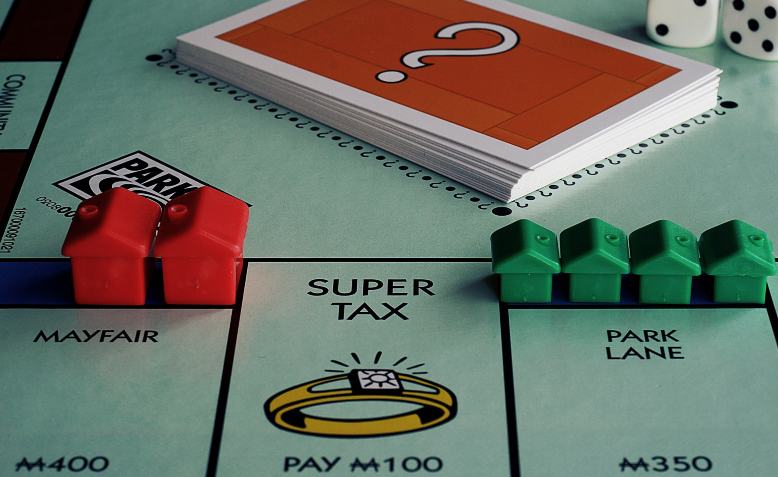 Monopoly Super Tax. Photo: Suzy Hazelwood / Pexels
Monopoly Super Tax. Photo: Suzy Hazelwood / Pexels
Starmer refusing to back a wealth tax shows he’s not going to fight against the Tories putting the cost of the crisis on working people, argues Shabbir Lakha
Since the coronavirus crisis began, over 650,000 jobs have been lost. This figure is expected to rapidly shoot up when the furlough scheme comes to an end and studies have estimated that we’re on track to losing over 4 million jobs. This is without factoring in the increasing likelihood of a second wave of the virus and a potential second lockdown.
At least a quarter of the British workforce has been on furlough and the majority of them have had their wages capped at the 80% which the government has subsidised. People who are self-employed, who make up about 15% of British workers, were capped at 70% and not eligible if they’ve been self employed for less than a year. In the first two weeks of the lockdown, there were over a million new Universal Credit claims, a 40% increase to over 4 million claimants and if successful they’ve received on average a meagre £95 a week.
While millions have seen their incomes reduce, from a starting point that was already not keeping up with rising costs, these costs – household goods, rent, utility bills – have remained the same or increased during the crisis. There has been zero support for renters and despite the so-called ‘eviction ban’ which was actually just a delay, March and April saw record numbers of tenants being evicted or at least being notified that they will be evicted once possession proceedings resume in August.
The Trussell Trust recorded an 89% increase in foodbank use and the Independent Food Aid Network saw a 175% increase in requests for emergency parcels between the end of March and beginning of June. Over a million children rely on the meal vouchers which the government tried its best to not provide before it was forced to u-turn by a popular campaign.
In sharp contrast to drastically increasing inequality, mass job losses and deepening poverty, the richest people in society have been completely shielded – and for a small number of people, have been profiting from the crisis. In June it was reported that UK billionaires have seen their collective wealth increase by £25bn.
The richest in society have not had to worry about risking their lives to work through the lockdown like essential workers, nor about losing their jobs, and they’ve been able to capitalise on the government furlough scheme and/or shedding jobs, the business rates holiday, cheap credit and rental income. They’ve been able to get home-testing kits before NHS staff and go to their second homes like the Cummings’s trip to Durham and Stanley Johnson’s visit to his villa in Greece. They’re not even trying to hide the fact that there’s one rule for the rich and another for the rest of us.
Rishi Sunak and the government are trying and failing to get people back to work and to boost consumption to kickstart the economy, which has already shrunk by 25%. As the questions of ongoing spending and who’s going to pay for it come up, the government is clear on where it stands. It intends to cut spending, for example by ending the furlough scheme, and it intends to make us pay for what it’s already spent, like we’ve already seen with the resumption of benefit sanctions and parking charges for NHS staff.
Calling for the richest in society to pay more in taxes is the bare minimum that we should be calling for. The theory of wealth ‘trickling down’ has been repeatedly debunked in the last decade, but especially at this time when the rich are getting richer while unemployment is soaring, the idea that the rich are job or wealth creators and should be let off is entirely redundant.
Yet, with this open goal set up for them, Labour has ducked away from demanding higher taxes on the rich. Keir Starmer and his Shadow Chancellor Anneliese Dodds are distinctly moving away from Labour’s 2019 election pledge to increase the top rate of tax for the top 5% of earners, and instead offered a mealy-mouthed proposition to the government to consider a wealth tax and without specifying on who or how much. On the Marr Show, Rachel Reeves said if the government proposed one, then Labour would consider it because apparently being a “constructive opposition” means taking your cues from the government and not taking a position until the next election manifesto.
A wealth tax is such a no-brainer, that 83 of the world’s richest people are asking for governments to increase their taxes. Of course, the fact that they are shows how inadequate a measure it is in and of itself, but that just reinforces how uncontroversial it should be.
In reality, we need to be demanding far more than a wealth tax. We’ve seen during the course of the pandemic that increased government spending doesn’t translate to spending where it’s actually needed to benefit working people. The bulk of government spending has gone to businesses, and even a huge amount of the extra money for the NHS has gone to private healthcare firms.
We should be demanding among other things for debt cancellation, for rent holidays and an increase in wages as well as Universal Credit. But if Labour can’t stick with their existing policy of marginally increasing taxes on the richest in society, it’s difficult to see how they will be fighting the government when they inevitably lay the costs of the crisis on working people.
Fund the fightback
We urgently need stronger socialist organisation to push for the widest possible resistance and put the case for change. Please donate generously to this year’s Counterfire appeal and help us meet our £25,000 target as fast as possible.

